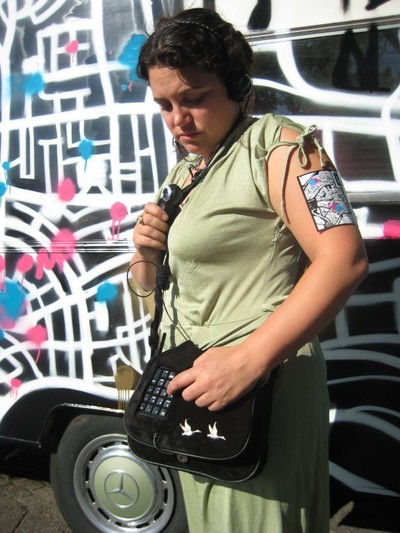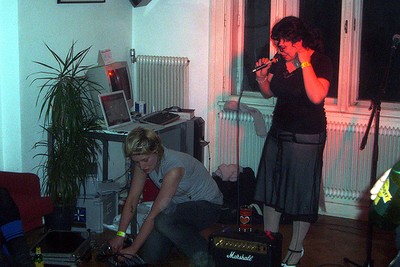Mirko Tobias Schäfer / Assistant Professor
University of Utrecht Department for Media and Culture Studies
Mirko Tobias Schäfer / Assistant Professor
University of Utrecht Department for Media and Culture Studies
Date October 2008 / Category News

For the annual conference of the Association of Internet Researchers in Copenhagen I have written a paper on explicit and implicit participation. The paper is part of a panel assembled by Kim de Vries on Community, Privacy, and Power: The Complex Relationships of Web 2.0. The panel revolves around social networking sites. Elfi Ettinger presents a research on e-recruiting platforms and the problem of out-dated data, Anders Fagerjord speaks on practices of self-representation on Facebook, Christian Ulrik Andersen focuses on games played on Facebook, and Kim de Vries discusses ephemeral communication unfolding on Facebook.
Tags conference
Date August 2008 / Category News

An often recurring motif in many films and stories is a character carrying a bag or a suitcase whose content is rather mysterious, unknown or of shady nature as purloined information, stolen goods or pornography. Inspired by these underworld milieu characters, Nancy Mauro-Flude aka sister0 conceived the performance "Bag Lady 2.0", for which she designed a bag, that is able to record, store and broadcast information in real time. Images can be taken with a camera attached to the bag, a microphone records sounds, even a GPS device can apply geographical data to identify the geographical location of the recorded sites. The functions of the bag can be controlled through a small keyboard attached to the bag. Equipped with that bag sister0 roams through urban spaces to collect images and impressions, that are then transmitted through open WLANs to a server. The bag is not only an item for collecting, but also for broadcasting gathered information in realtime.
[d]vision, the Vienna International Festival for Digital Culture is back with a new festival. Realtime generation is entirely dedicated to the demoscene and realtime animated visuals. Since last year the dvisionaries and their new director Regina Webhofer have been preparing this year's festival with a series of smaller events to present demos and outstanding coders to a broader audience outside the dynamic demo scene sphere. In close collaboration with the scene, [d]vision has set up a full scale festival with an exhibition, demo screenings, lectures, and panel discussions. And the popular nerd venue Werkzeug H hosts a daily demo lounge. After this packed program the festival features a demo party on which scene members from all over Europe compete for coding the best demo.
The festival takes place from July 4 to July 20 at Museumsquartier Vienna, Werkzeug H,and Metalab.
Program and information at [d]vision.
Tags Event
Date April 2008 / Category News
The Dutch television program Tegenlicht (Backlight) at VPRO featured a documentary on Wikipedia. Questioning the construction of knowledge as either expert generated in Encyclopaedia Britannica or collaboratively created in Wikipedia the documentary follows the various perspectives. Interviews with enthusiastic promoters of new technologies contrast with the culture pessimist view represented by self acclaimed "Anti Christ of Silicon Valley" Andrew Keen. However the documentary does not point out that neither Keen nor the techno-enthusiasts are part of the analysis of this question of knowledge in the digital age but one of its symptoms. Reducing cultural production dichotomously to mediocre amateur creations or to a revolution of professional amateurs is rather short sighted.
The documentary's website provides extra information and valuable links to a more comprehensible understanding of the debate and its participants. It also features my comments on Wikipedia.
Tegenlicht/Backlight: Wiki's Waarheid, website at VPRO
The Truth According To Wikipedia, at YouTube
Date March 2008 / Category News

Im transcript Verlag ist das Buch "SUBversionen. Zum Verhältnis von Politik und Ästhetik in der Gegenwart" erschienen. Die Herausgeber Thomas Ernst, Patricia Gozalbez Cantó, Sebastian Richter, Nadja Sennewald, und Julia Tieke versammeln in dem Band Beiträge, die subversive Strategien in Kunst und Medien kritisch reflektieren. Neben Texten zur Geschichte und Wirkung des Subversiven im Allgemeinen, werden subversive Strategien in den Bereichen Theater, Fotografie, Literatur, Film und Mode analysiert und bewertet. Zusammen mit Hans Bernhard von Ubermorgen.com trage ich dazu mit einem Artikel über die Ambivalenz des Subversiven bei.
Tags Book
Date October 2008 / Category News
The annual conference of the German association for media studies (Gesellschaft für Medienwissenschaft) hosts a panel with scholars from Utrecht University. Ann-Sophie Lehmann, Eggo Müller, Martina Roepke and MTS present four papers on amateurs and media practice.
"Hands On. Das wertvolle Wissen der Amateure. Kollaboration, Konvention und Tacit Knowledge in den digitalen Medien." This panel presents concepts for analysing media practice without following the moral framework that usually celebrates enthusiastically the alleged user participation as revolutionary change in cultural production. User activities are analysed in context of social interaction, power relations, and hands-on skills as well as the role of shaping and sharing knowledge of technology. Using case examples from P2P file sharing, Flickr and YouTube, the four presentations discuss user activities as practice of design appropriation and as implementation into commercial applications.
Jahrestagung 2008, "Was wissen Medien?", October 2-4 2008, Institute for Media Studies, Ruhr-Universität Bochum. Gesellschaft für Medienwissenschaft
Tags conference German
Date August 2008 / Category News
While so far Europe's politicians have luckily been unable to install a centrally organized police authority that spies on its citizens and strips them of their citizens rights, the United States has witnessed the emergence of a powerful and frightening authority that threatens to invade all areas of private life and monitor all citizens. The Department for Homeland Security seems to top all Orwellian nightmares.
How unbalanced and unquestioned power, paired with the excessive use of information technology for surveillance and pattern recognition is undermining democracy and constituting repression is described in a timely novel by Cory Doctorow.
Tags Review
Date April 2008 / Category News

The Viennese Wohnzimmerkonzert featured an evening with MuQua artist in residence Nancy Mauro-Flude, aka Sister0, and London based "pirate, post-postmodernist, rebel and rock star" performer Jesse Darlin'. The concerts literally take place in Costa Caspary's small living room, and as a good host he even provides a buffet and cold beers in his kitchen. The two artists rocked the LabFactory the previous night with Sister0's performance, "My First Burial", and Jesse Darlin''s "I Was A Teenage Porn Star". Tonight was on the whole a fast, fragile and funny performance of songs, poems and some in-between chit-chat; stand-up rock stars forced to low volume. Performing a cappella without microphones, spiced with iconoclastic humour and never taking themselves too seriously, their appearance was an unplugged post-punk version of chamber music for the jilted generation coming of age. Jesse Darlin', subtle and clownish while performing her song "When The Machines Went To Sleep" is evocative of Blade Runner-like replicants. The congenial duo complements one another, as the punk-vaudeville act of Jesse Darlin' provides a constant commentary to Sister0. They draw from a cornucopia of intertextual references to create an indisputable post-ironic winking collage of punk-rock gone coffee party. Subverting any intellectual interpretation the duo manages to literally perform their own commentary and discourse simultaneously in their show.
Beyond Vienna's posh culture venues, limited to an oddly small living room and stripped of sound equipment, Jesse Darlin' and Sister0 remain unquestionably passionate and sovereign artists, convincingly performing straight from the cerebral cortex.
Tags Review
Date March 2008 / Category News

Finally Springer published the long expected volume "Philosophy and Design. From Engineering to Architecture" edited by Pieter Vermaas, Peter Kroes, Andrew Light and Steven A. Moore. It consists of 25 essays reflecting engineering and design as issues for philosophy and ethics. The contributions provide philosophical and ethical analyses ranging from rather traditional engineering to emerging practices in genetics, nanotechnology, software design and information technology. The editor's introductory chapter emphasizes the meaning of design and engineering as a theme for philosophy and maps comprehensively the field according to philosophical, societal and ethical issues. Carl Mitcham, author of "Thinking Through Technology" praises the book as "significant contribution to the expanding field of design studies [...] It is also the first collection of philosophical papers to bridge the divide between critical reflections on design in engineering and in architecture."
Bernhard Rieder and I are pleased to contribute a piece on software design using open source as an example to emphasize the cultural context of engineering.
Get the book at Springer.
Read our article (.pdf)
Tags Book
Date November 2007 / Category News
The right wing party winning the latest elections in Switzerland communicated their political objectives in an online game. As reported by Ian Bogost on Watercoolergames the game's hero is a white cartoon goat called Zottel. In "Zottel rescues Switzerland" the user has to solve missions such as kicking out black sheep "representing criminal foreigners", intercepting passports issued to immigrants and shooting "EU tax collectors" for the sake of a "flourishing Switzerland." (see screen shots)
The shocking aspect of the game is its trivialized racism, presented as a playful and harmless game. It would have been impossible for the Swiss People's Party to launch a version of Ethnic Cleansing a racist First Person Shooter developed by Neo-Nazi label Resistance Records. Even right-wing conservatives would have distanced themselves from the obvious endorsement of violence, white power, and racism. But it is actually that very spirit that the Zottel game thrives on.
Xenophobia and racism are wrapped into a cheerful online game promoting the People's Party's concern for safety, order and independence. Employing stereotypes of criminal immigrants, unwilling to adapt to Swiss law and culture, the People's Party promotes nationalism and hatred for foreigners as funny leisure activity. The obvious implication is actually the call for race war and genocide promoted explicitly in Ethnic Cleansing. The campaign represents the recent trend in European politics making nationalism sociable as protectionist conservative policy.